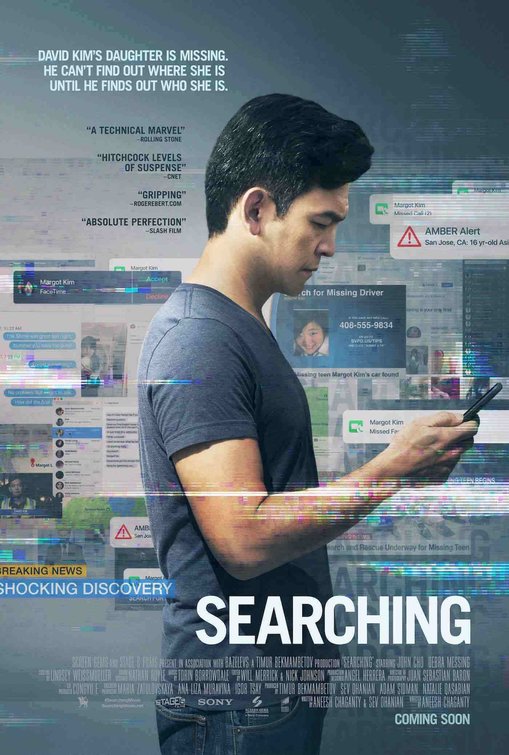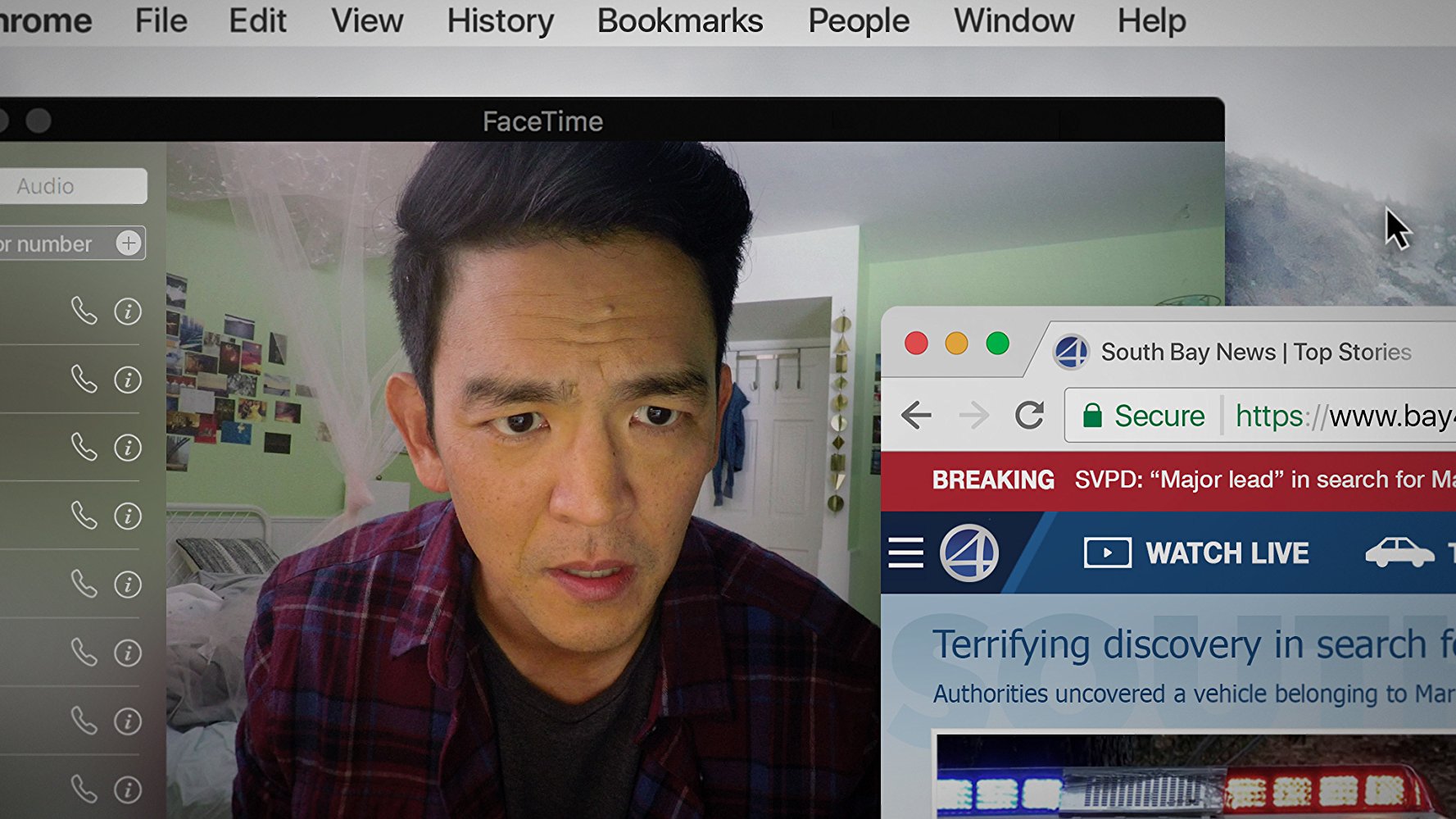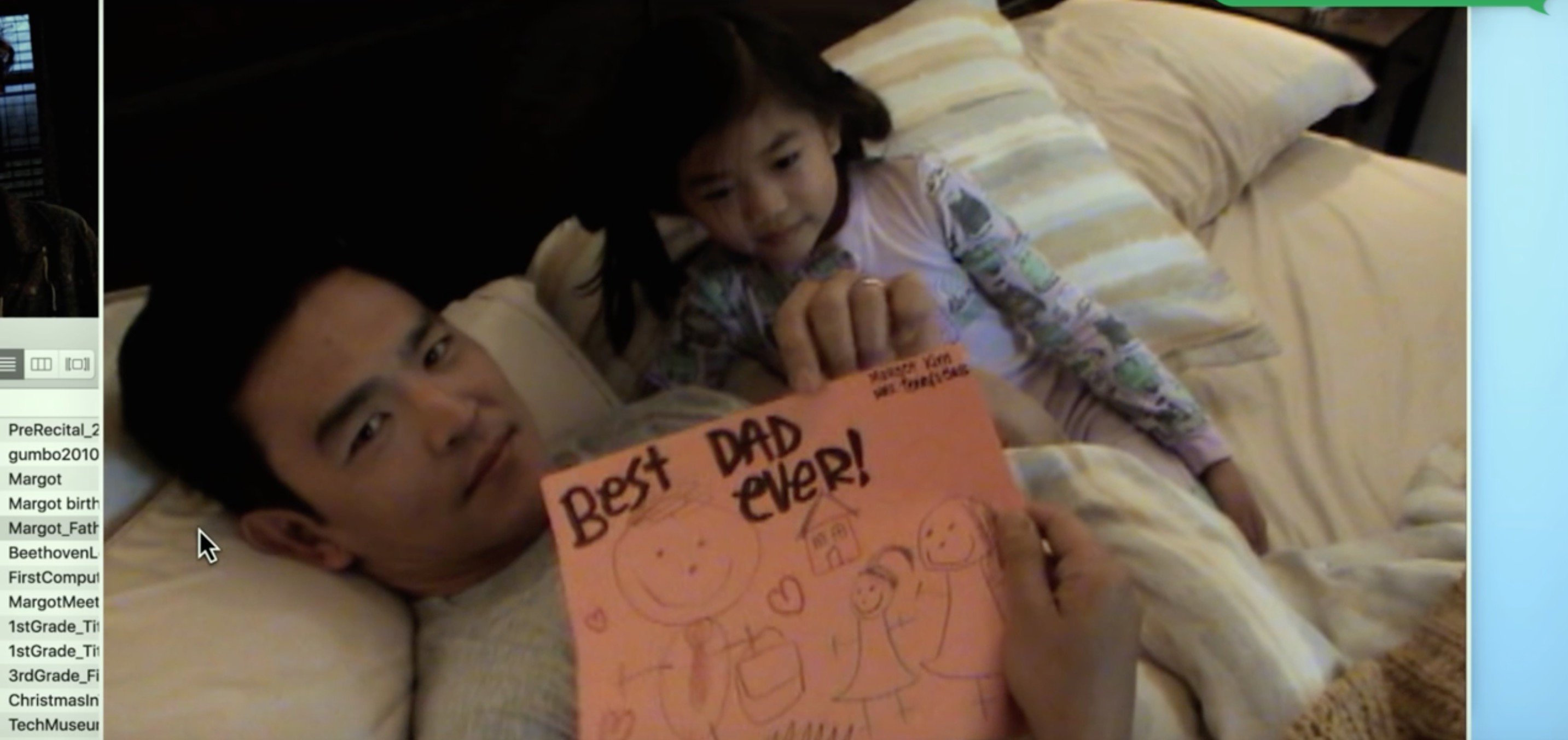by Lynn Lee
 At first glance, Searching has all the marks of a conventional “missing child” thriller. Single dad’s teenage daughter goes awol, leaving signs to fear the worst; police investigation reaches dead end or obviously-wrong conclusion; dad realizes there was too much about his daughter he didn’t know but doggedly solves the mystery on his own after several red herrings and, of course, a shocking twist. Slightly condensed, the entire film could fit into a one-hour TV crime procedural. As it is, the movie clocks in at a lean, tightly paced 102 minutes and hits all the requisite plot beats with impressive efficiency.
At first glance, Searching has all the marks of a conventional “missing child” thriller. Single dad’s teenage daughter goes awol, leaving signs to fear the worst; police investigation reaches dead end or obviously-wrong conclusion; dad realizes there was too much about his daughter he didn’t know but doggedly solves the mystery on his own after several red herrings and, of course, a shocking twist. Slightly condensed, the entire film could fit into a one-hour TV crime procedural. As it is, the movie clocks in at a lean, tightly paced 102 minutes and hits all the requisite plot beats with impressive efficiency.
And yet, there is something different about Searching that distinguishes it from other examples of the genre. Two somethings, actually...
First, there’s the casting of an Asian American actor, John Cho, as the lead – which shouldn’t be noteworthy but still is, even in a post-Crazy Rich Asians world. Second, while the narrative may be formulaic, the manner in which it’s presented is unusual: Every single scene is shot from the perspective of a computer or phone screen. It’s how we see all the dad’s investigative work as he combs through his daughter’s social media accounts and news coverage of her disappearance while engaging in increasingly frantic phone, text, and FaceTime exchanges with everyone who knew her and the police investigator on the case.

Searching isn’t technically the first feature film to use this viewpoint device; that would be the 2014 teen horror flick Unfriended. But this may be the first time it’s been deployed to elicit the full gamut of human emotions – from joy at childhood milestones to grief for the wife/mother who succumbs to cancer (in an opening montage sequence reminiscent of Pixar’s Up), to a present-day father and daughter’s humorous day-to-day annoyance with each other, to pained recognition of their inability to communicate at any deeper level since the mom’s death, to the father’s hard swings between fear, anger, and obsessive need to discover the truth as he endures every parent’s worst nightmare. This canny emotional manipulation-via-digital interface is all very much by design, as director and co-writer Aneesh Chaganty – who used to make ad videos for Google, natch – has indicated in interviews.
Of course, it wouldn’t work without the right actors to put a face and voice to the screen-within-a-screen activity unfolding before us. Fortunately, the likable Cho is eminently relatable as David Kim, the Everydad who may be uninformed as to his daughter’s activities or the latest forms of social media she’s been engaging with, but proves a quick study and unexpectedly good sleuth. He’s well paired with Debra Messing, equally convincing as the competent and sympathetic detective working his case; and the snippets we see of David’s daughter, Margot (Michelle La), effectively evoke a bright, seemingly well-adjusted girl with a secret well of sadness and loneliness. But it’s up to Cho to carry the film’s emotional weight and make the audience care, which he does with an understated slow burn that’s far more powerful than more dialed-up histrionics would be.

Perhaps the most subversive aspect of Searching isn’t the casting or the forced perspective but the way in which it depicts the protagonist’s attitude towards the more chaotic and deceptive aspects of the Internet and social media. Instead of being passively flummoxed or overwhelmed by the unfamiliar seas where he finds himself, David’s able to impose his own will and order on them to get what he needs from them. (Despite the gravity of the situation, it still amused me to see him compiling all the data he gathers from Margot’s “friends” in an Excel spreadsheet.)
You hear a lot these days about people, groups, and even governments “weaponizing” social media, a phrase that carries an aggressive and generally negative connotation; Searching may be the first Hollywood product that shows it being “weaponized” in a positive and even righteous way. [POTENTIAL SPOILERS] Even if the movie also suggests Margot resorted to social media as an outlet for emotions she couldn’t share with her dad, which ultimately led her in harm’s way, it makes clear that that was a symptom, not a cause, of the rift between them—and it’s also social media that helps him reconnect with her. In this respect it’s interesting to compare Searching with Eighth Grade, which coincidentally was the last film I saw before this one, and which similarly observes, without judging, an adolescent girl rely on social media both to define a public “face” that doesn’t really reflect her private reality and to express feelings she doesn’t know how to communicate to the people she actually knows – including her loving but clueless single dad.
In being so much a movie of this current digital moment, is Searching also chained to that moment? Even as I admired its cleverness, I couldn’t help wondering if the novelty of its technological format wasn’t a double-edged sword. Will we all be communicating in such different ways that it will look hopelessly dated in ten years, or even less? Perhaps. But even if it does, it could still be an interesting cultural snapshot of Hollywood’s view of social media at this time – as a threat to its dominance that it still hopes to control and harness for its own profit. Maybe the movie should be subtitled “How We Stopped Worrying and Learned to Love the Vlog.”
GRADE: B